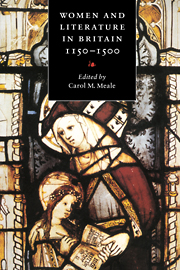Book contents
- Frontmatter
- Contents
- List of illustrations
- List of abbreviations
- Chronology: women and literature in Britain, 1150–1500
- Introduction
- 1 The power and the weakness of women in Anglo-Norman romance
- 2 Women as lovers in early English romance
- 3 Mothers in Middle English romance
- 4 ‘Clerc u lai, muïne u dame’: women and Anglo-Norman hagiography in the twelfth and thirteenth centuries
- 5 Women in No Man's Land: English recluses and the development of vernacular literature in the twelfth and thirteenth centuries
- 6 ‘Women talking about the things of God’: a late medieval sub-culture
- 7 ‘… alle the bokes that I haue of latyn, englisch, and frensch’: laywomen and their books in late medieval England
- 8 Women authors and women's literacy in fourteenth- and fifteenth-century England
- 9 Women and their poetry in medieval Wales
- Further reading
- Index of manuscripts
- Index of names and titles
1 - The power and the weakness of women in Anglo-Norman romance
Published online by Cambridge University Press: 09 November 2009
- Frontmatter
- Contents
- List of illustrations
- List of abbreviations
- Chronology: women and literature in Britain, 1150–1500
- Introduction
- 1 The power and the weakness of women in Anglo-Norman romance
- 2 Women as lovers in early English romance
- 3 Mothers in Middle English romance
- 4 ‘Clerc u lai, muïne u dame’: women and Anglo-Norman hagiography in the twelfth and thirteenth centuries
- 5 Women in No Man's Land: English recluses and the development of vernacular literature in the twelfth and thirteenth centuries
- 6 ‘Women talking about the things of God’: a late medieval sub-culture
- 7 ‘… alle the bokes that I haue of latyn, englisch, and frensch’: laywomen and their books in late medieval England
- 8 Women authors and women's literacy in fourteenth- and fifteenth-century England
- 9 Women and their poetry in medieval Wales
- Further reading
- Index of manuscripts
- Index of names and titles
Summary
Assumptions about the role of women in medieval romance have often sprung from a supposition that their general lack of power and influence in medieval society must necessarily be reflected by powerlessness in that society's fiction. So a recent historian has sweepingly dismissed ‘the helpless damsels in courtly romances who are prone to victimisation by dragons’. But, as she herself acknowledges in the same article, it is more usual for both historical and literary sources to provide conflicting images of women. It is the purpose of this essay to examine the ambivalent and inconsistent images of women provided by one small corner of medieval fiction – the Anglo-Norman romances of the twelfth and early thirteenth centuries – and to consider how they relate to historical circumstances.
Noblewomen in post-Conquest Britain appear to have enjoyed less political and economic power than either Anglo-Saxon women or their counterparts in France. In pre-Conquest England, women of the propertyowning classes would seem to have had comparatively greater independence, education, status and freedom of choice in marriage. They could control an often substantial morgengifu after marriage; they could leave a marriage unpleasing to them, with their children and half the property; and their goods were not regarded by the courts as held in common with those of their husbands. They could have a say in choosing their partner and were not repudiated if their marriage proved childless. The evidence from the relatively few surviving wills is that both wives and daughters could inherit, control and bequeath property independently of their fathers and husbands, and some women, certainly, were the owners of considerable amounts of land.
- Type
- Chapter
- Information
- Women and Literature in Britain, 1150–1500 , pp. 7 - 23Publisher: Cambridge University PressPrint publication year: 1993
- 3
- Cited by



